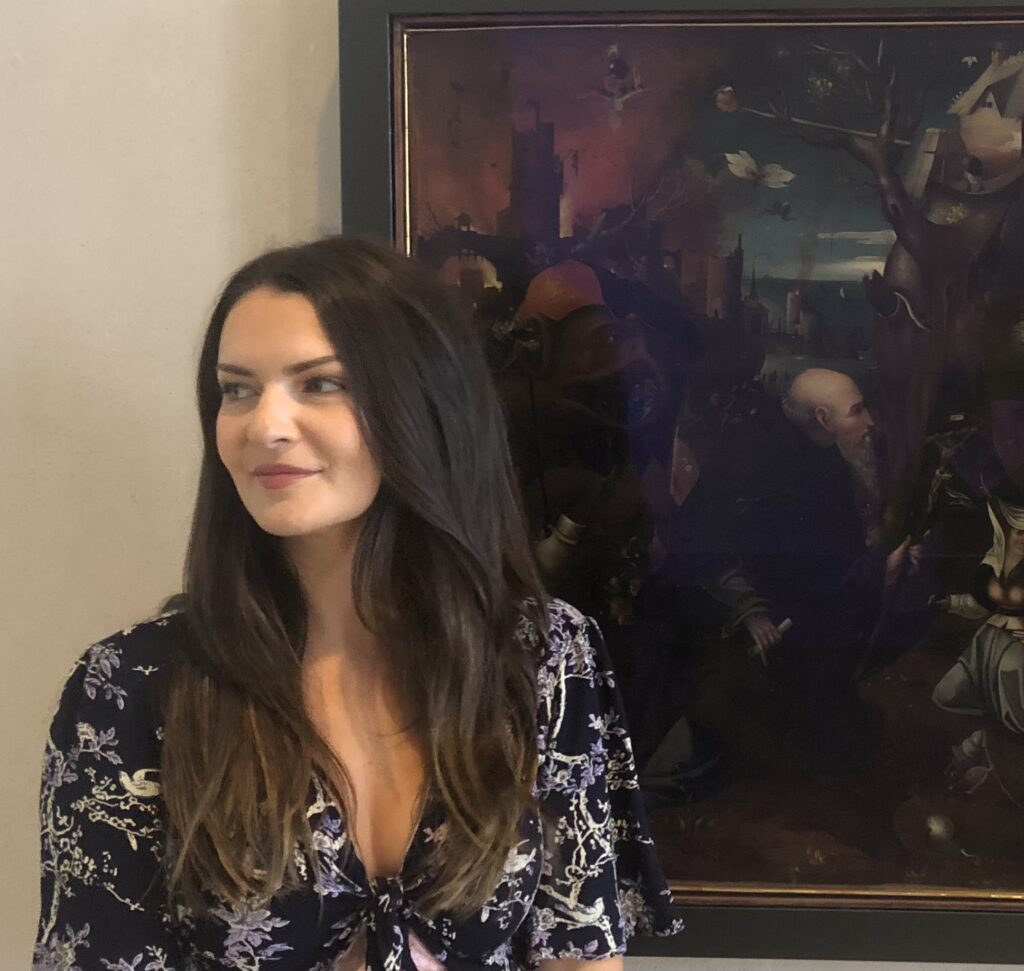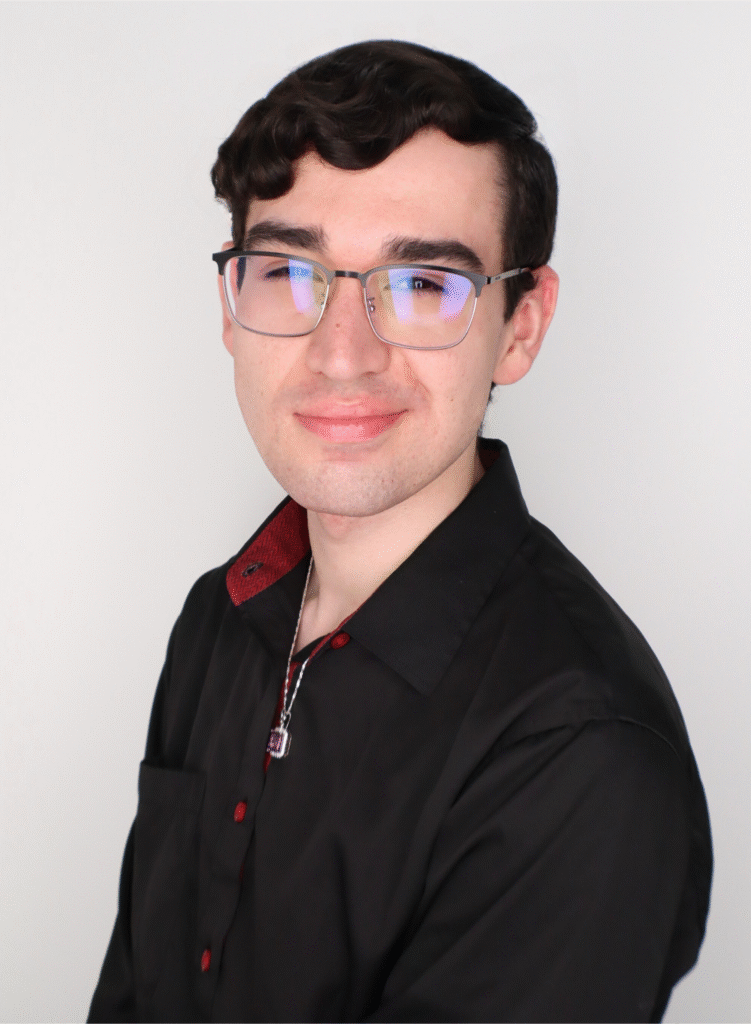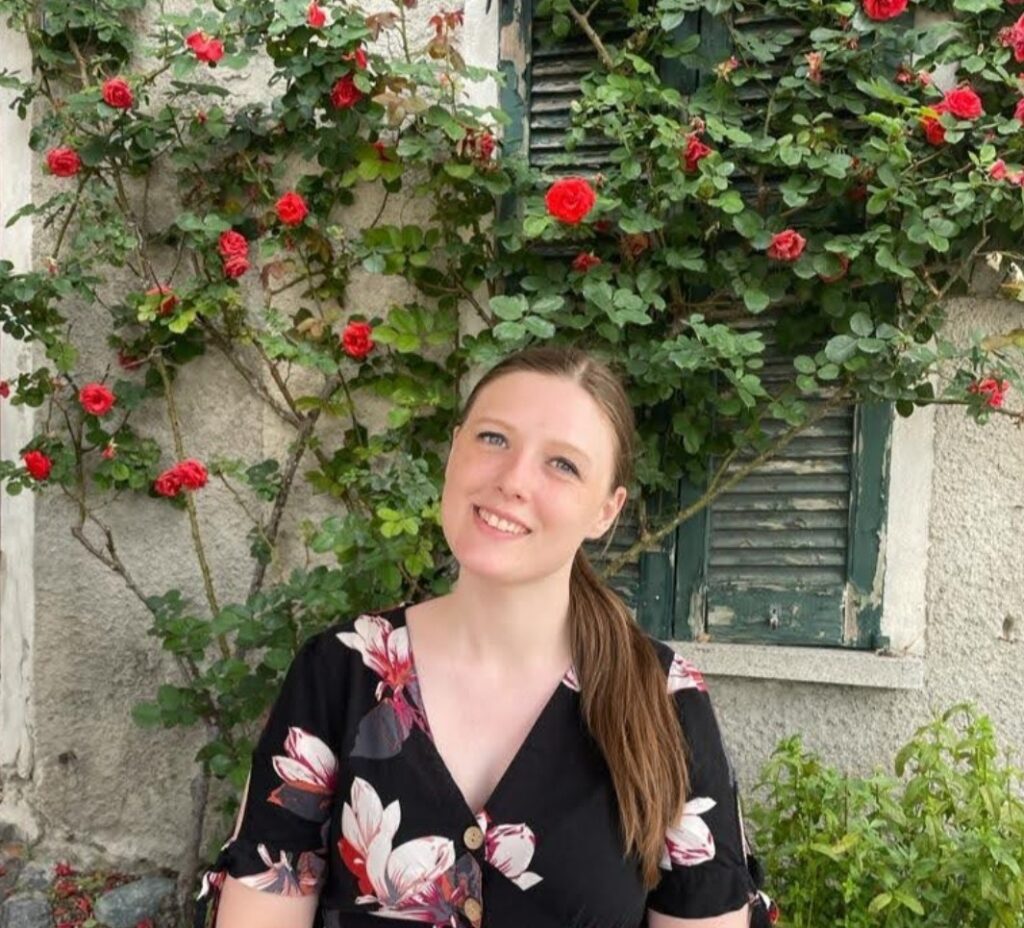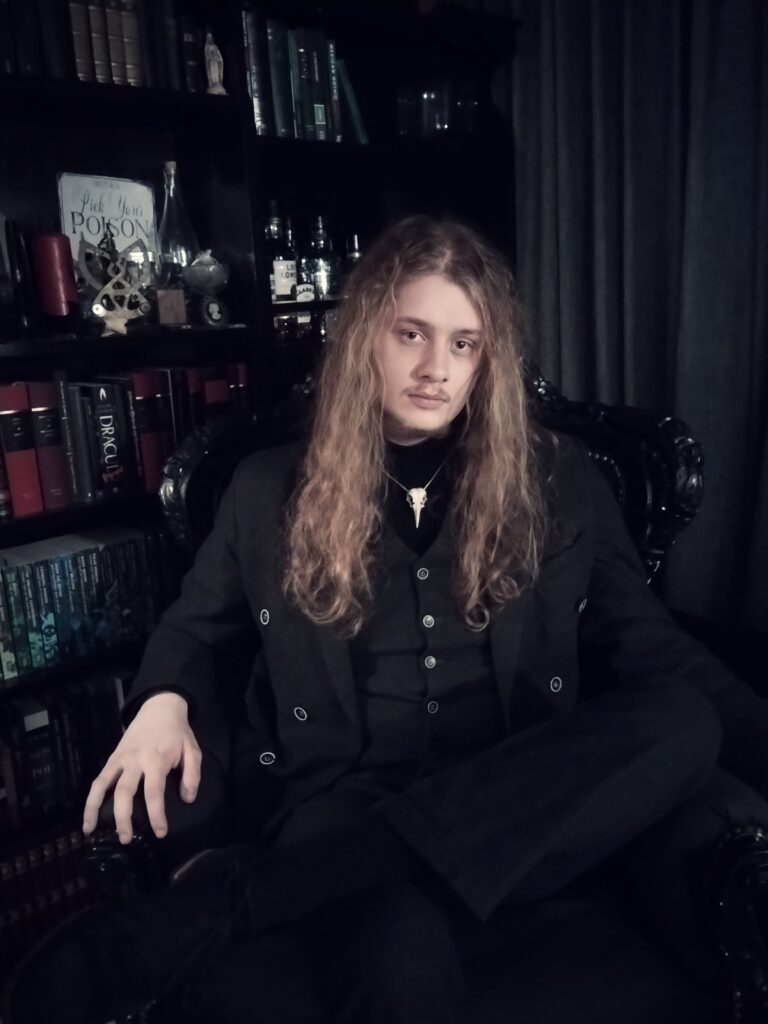Postgraduates

Sarah Dutson (she/her)
Supervisory Team: Dr Emma Liggins and Dr Angelica Michelis
Thesis Title: ‘Spiritualism was triumphant’: The Legacy of Spiritualism as a Feminist Counternarrative to Patriarchy in Neo-Victorian Gothic Fiction 2010 to 2025
Sarah Dutson is a PhD candidate at Manchester Metropolitan University, where she recently completed her MA in Gothic Studies. Her research interests include women’s writing and the supernatural, with a particular focus on spiritualism and the occult in neo-Victorian women’s Gothic fiction. Sarah’s current research examines the figure of the female medium, exploring how neo-Victorian Gothic novels by women writers use this character to reflect and interrogate the position of women in society.

Karmel Knipprath (she/her)
Supervisory Team: Dr Sorcha Ní Fhlainn and Dr Xavier Aldana Reyes
Thesis Title: ‘Always, worlds within worlds’: Clive Barker’s Transmedial Gothic (1978-present)
Karmel’s research project formally identifies Clive Barker as an important yet critically undervalued British polymath who has successfully advanced, expanded, and altered, the formal, aesthetic, and political limitations of several genres and assorted media through his unique deployment of the Gothic mode.

Fredrik Blanc (He/Him)
Supervisory Team: Dr Chloé Germaine and Dr Xavier Aldana Reyes
Thesis Title: Towards a Weird Hydropoetics: Monstrosity, Thalassophobia, and Aquatic Transcorporealities in Modern and Contemporary Weird Fiction
In my thesis, I explore the evolution of aquatic hybridity and monstrosity in modern and contemporary Weird Horror and Science Fiction. I articulate the place and significance of water and seascapes in the Weird fiction of H.P Lovecraft and William Hope Hodgson as well as the ways in which writers of the 21st century such as China Miéville, River Solomon, and Jane Rawson meaningfully rewrite and re-appropriate such tropes.

Rebecca Alaise (she/her)
Supervisory Team:
Project title: ‘Ethereal Instruments: The Singing Voice in Literary Representations of Gothic Music in the Long Nineteenth Century’
My project explores the alterity of the singing voice by charting the development of representations of vocality in Gothic fiction published between 1820 and 1909, proposing that the long nineteenth century exhibited a mounting sense of music’s Gothic uncanniness which reached its zenith at the fin de siècle. By engaging with theories of sonic Gothic as well as cultural histories of sound technologies, the occult and of sacred and stage music, it analyses the power of disembodiment to both distance us from the corporeality of voice producers yet also ‘throw’ voice into a variety of unhuman/parahuman objects.

Brontë Schiltz (she/her)
Supervisory Team: Dr. Xavier Aldana Reyes and Dr. Sorcha Ní Fhlainn
Thesis Title: ‘Mediation, Manipulation and Exploitation: Britain’s Televisual Gothic, 1953-2024’
My thesis explores the use of the Gothic to explore ethical quandaries within Britain’s public service broadcasting industry across seven decades of British television drama, from Nigel Kneale’s The Quatermass Experiment (1953) to Reece Shearsmith and Steve Pemberton’s Inside No. 9 (2014-24). It traces the the role of Gothic narratives in articulating seventy years of crises: policies preventing broadcasters from reporting on British Cold War activities; changes to public services, including broadcasting, under neoliberalism; and abuse perpetrated by high-ranking television staff and the resulting proliferation of suicides associated with participation in reality television in particular.

Kirsten Imani Kasai (she/her/hers)
Supervisory team: Dr Chloé Germaine, Prof. Helen Mort
Thesis Title: “Kiss, Marry, Kill, Transform: The Quadripartite Witch, Absent Voices and Feminine Power in Historical Witchcraft”
Witchcraft studies often focus on European Satanic witchcraft, neglecting marginalized voices and the metaphysical dimensions of the practice. My research addresses these gaps, utilizing metatextual and intertextual approaches to establish an essential theoretical context for restructuring our understanding of witchcraft as a tool of historical revision and reparation, while proposing the quadripartite witch as an extended metaphor to categorize liminal spaces as platforms for reparative storytelling. Through the Ethno Gothic, I explore how witches from Black, Brown, Indigenous, and nonbinary communities challenge Eurocentric representations and patriarchal power structures. Kiss, Marry, Kill, Transform re-envisions witchcraft as an expression of personal power and contributes to current conversations about individual and feminist agency. By synthesizing and presenting this necessary information in a new way, I hope that my work reframes witchcraft as a foundational source of resistance, spiritual growth, and metaphysical expression.
Image credit: Image by Adrianne Mathiowetz Photography

Alice Durocher (she/her)
Supervisory Team: Dr Matt Foley and Dr Chloé Germaine
Thesis Title: Gothic Cities: Edinburgh, Paris and Manchester in Contemporary Literature and the Cultural Imagination.
My PhD examines how Paris, Edinburgh and Manchester are associated with and represented as Gothic in myths, narratives and popular culture from the nineteenth century through to contemporary representations in literature, films and gothic tourism.

Dalton Sikes (he/him)
Supervisory Team: Susan Barker and Dr Matt Foley
Thesis Title: Mere Image: A Research Study & Creative Reimagining of Haunting in Gothic Horror as a Contemporary Tool to Process Trauma & Memory.
Dalton Sikes is an American writer, poet, essayist, and enthusiast of spectrality studies, who moved to the UK for his PhD candidacy at Manchester Metropolitan University. His research identifies and analyzes the role of “hauntings” within Gothic literature as a means of providing catharsis to readers struggling with complex traumas and repressed memories. His work seeks to expand upon the existing literature by producing both a research project and a substantive novel that grapples equally with intersectional identities (i.e. gender, race, and sexuality), allowing a diverse readership to experience the Gothic’s previously inaccessible cathartic ability to reclaim the self, “exorcizing” the demons from their own homes.

Georgina Kett (she/her)
Supervisory Team: Dr. Emma Liggins, Susan Barker, and Dr. Eleanor Beal
Thesis Title: Glass Coffins: A creative/critical investigation into the Gothic genre’s regenerative ability to confront and disturb continuing social hypocrisies regarding performative boundaries and the commodification of femininity in a haunted ‘postfeminist’ society.
Georgie Kett is a writer, teacher and PhD candidate, whose research aims to reinforce the Gothic genre’s continued relevance as a form of societal mirror, by engaging with and contemporising traditional thematic motifs and conventions of this genre in her creative writing. By allegorising the impact that ‘influencer culture’ and a pervasive commodification of beauty standards has in an increasingly social media driven society, she seeks to explore how ubiquitous hypocritical patriarchal conventions still permeating through the membrane of society continue to reinforce the female body as a site of performance, competition and exploitation.
MCGS International Research Intern

Simon Scothans (he/him)
Home Institution: Radboud University, Netherlands
Intern Managers: Dr Eleanor Beal and Dr Emma Liggins
Simon Schothans is an international research intern at the Manchester Centre for Gothic Studies, and a student of literary studies at Radboud University. His research project aims to construct a theoretical background for the enigmatic ‘cosmic bliss’ phenomenon as it appears in contemporary Eco-Weird Horror. Taking nature and the unknown as cosmic forces, he focuses on corporeal amalgamation, (in)congruent experiences of the subject and its observer, and underlying fear-desire dynamics.
